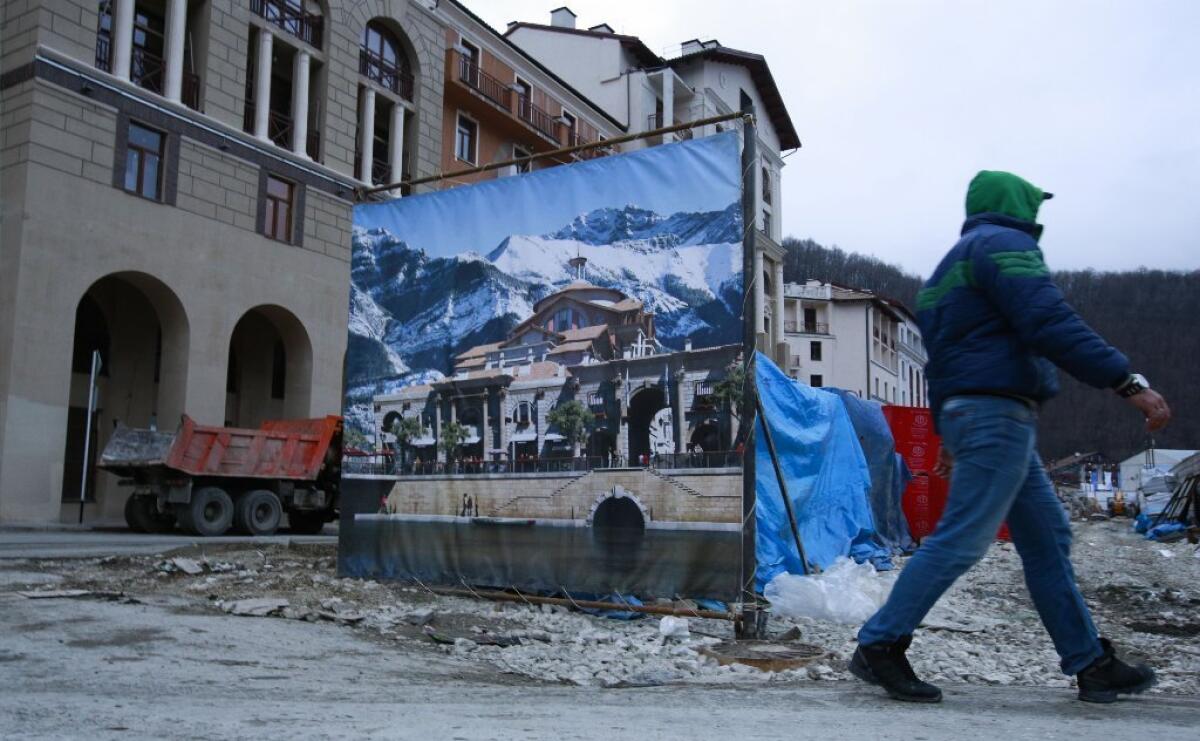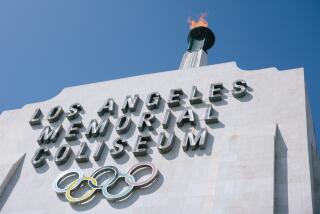For media in Sochi, it’s more Potemkin village than Olympic village

Does Sochi have a Yelp rating yet? If so, the place that Russia promised would be a state-of-the-art Olympics city, the place that would grow into a Slavic Aspen, the Gstaad of the Russian Riviera, would be starless right now.
Reporters arriving ahead of the Olympic Games have found unfinished roads and hotel rooms, and provisions that make combat rations look enticing: a packet of honey with a real honeybee still in it, perhaps like the worm in a bottle of mescal — but probably not.
Drinking water that looks like it came out of a toilet, and a toilet with a sign saying, “Please do not flush toilet paper down the toilet!” Who knew Orwell wrote comedy?
The bad news in one hotel was that it had no water, which turned out to be good news: As Chicago Tribune reporter Stacy St. Clair related, the front desk at her hotel told her not to wash her face with the (nonexistent) water “because it contains something very dangerous.” (Rooms for early arriving athletes are reported to be in much better shape and suites for Olympic officials to be positively imperial.)
Sportswriter Dan Wetzel scored three light bulbs, and tweeted that he would swap them for a doorknob for his hotel room. There is no Wi-Fi in some places, which may be good news, because veteran NBC reporter Richard Engel said he had barely stepped off the plane before his computer and cellphone were hacked.
The Games haven’t started yet, so the arriving reporters are reporting on the state of readiness in Sochi, which is not very. And Russian officials are upset about the awful reports, not the awful realities.
When Dmitry Kozak, the man in charge of Olympic preparations, blamed the guests — some people had turned their shower heads to the wall and run them all day; you could see it on surveillance videos — an aide dragged him away, but not before the headline wrote itself:
“The Russians have put surveillance cameras in the showers.” (Another aide later denied it.)
Russia has known for seven years that the Olympics were coming to Sochi. Seven years to build and create and fix, and a reported $50 billion to do it with — about seven times what the Vancouver Games cost.
It sounded a bit familiar to me, and I’m nowhere near Sochi.
I was in Russia — the last year or two of the Soviet Union, actually — in the autumn of 1989, not long before I went to Berlin for the fall of that Cold War wall. What I saw in Russia put me in mind of the famous story — a fable, it turns out, but one that shoulders a great weight of truth, as many fables do — of the Potemkin village.
Empress Catherine the Great planned to float down the Dnieper River with a fellow monarch to impress him with Russia’s greatness. And the story is that her lover, Gregory Potemkin, managed to raise up facades of prosperous villages along the river, costuming his minions as happy peasants and — in one version — dismantling the villages by night and reassembling them downriver for the empress’ next stop. Think of the “Blazing Saddles” town of Rock Ridge, with borscht.
Myth though this is, it’s caught the imagination because it seems so Russian. The top-grade hotels where I stayed looked splendid at first look, with gilt and brocade in chandeliered lobbies. But 15 minutes on the premises showed the feint behind the facade.
Hallways were fitfully heated, the plastering and wallpapering hit and miss. The room was adequate, but I was glad I had taken friends’ advice and bought my own toilet paper. The hot water was hot only by comparison to permafrost. I’d also been advised to put a little gift on the bed for the chambermaid — toiletries, nice pens — so she wouldn’t be inclined to filch from me.
When I tried to close the hotel room door, it wouldn’t completely shut. As I shoved my shoulder against it over and over, I thought, “This is communist Russia. This is the superpower we’ve been brought up to fear and arm ourselves against. And they can’t even hang a door properly.”
As I flew out of Moscow’s airport — where I fed the leftover cheese I’d brought with me to a couple of stray dogs of the kind Vladimir Putin plans to have shot or poisoned in Sochi — I took my seat aboard the Aeroflot flight to London.
At once, the seat-belt buckle came off in my hands. I called over a flight attendant, who shrugged and took the buckle and walked away.
What could I do? I tied the seat belt around me as best I could and drank another glass of Champagne. It flowed like Dnieper River water, the whole flight home.
ALSO:
Alyssa Milano, media actorvist
The Christopher Dorner manhunt: Bad judgment by policeFollow Patt Morrison on Twitter @pattmlatimes
More to Read
A cure for the common opinion
Get thought-provoking perspectives with our weekly newsletter.
You may occasionally receive promotional content from the Los Angeles Times.







